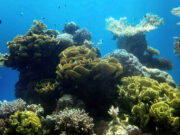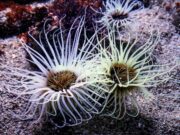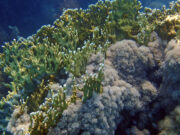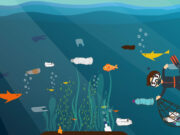Metals like copper from agricultural runoff and marine paint leaching from boat hulls poses a threat to soft coral sea fans, especially in warming seas.
While plastics and microplastics are a well-known threat to the world’s oceans, the effect of metal contamination is poorly understood, according to the study published in the journal Ecological Applications.
Over a one-year period, the researchers tracked 175 individual sea fan colonies with varying levels of copper concentrations found in the sediment at 15 coral reef sites around Puerto Rico. They found that reefs with higher copper concentrations in the sediment suffered a reduction in recovery from multifocal purple spots disease – a disease that can plague the gorgonia sea fans.
In the laboratory, the researchers Allison Tracy, Ph.D and Drew Harvell, professor of marine biology at Cornell University, found that sea fans initially launched an immune response to a damaging infection at low levels of copper and temperature stress. But when copper concentrations were boosted, sea fans’ immune response failed, which suggests that copper stressed the sea fans and eliminated their immune potential, she said.
Warming often increases disease risk. In coastal ecosystems, metal pollution is a pervasive stressor that increases the risk of disease in many organisms, including soft corals. In the study, multifocal purple spots disease severity increased most at warmer sites with high copper level. Reducing copper and other pollutants that compromise coral health on a local scale may help corals fight disease in a warming ocean.
Previously researchers have shown that excess nutrients negatively affect coral reefs and reduce their resilience to climate change.
Photo credit: Garry Frazer @garryfrazer

















